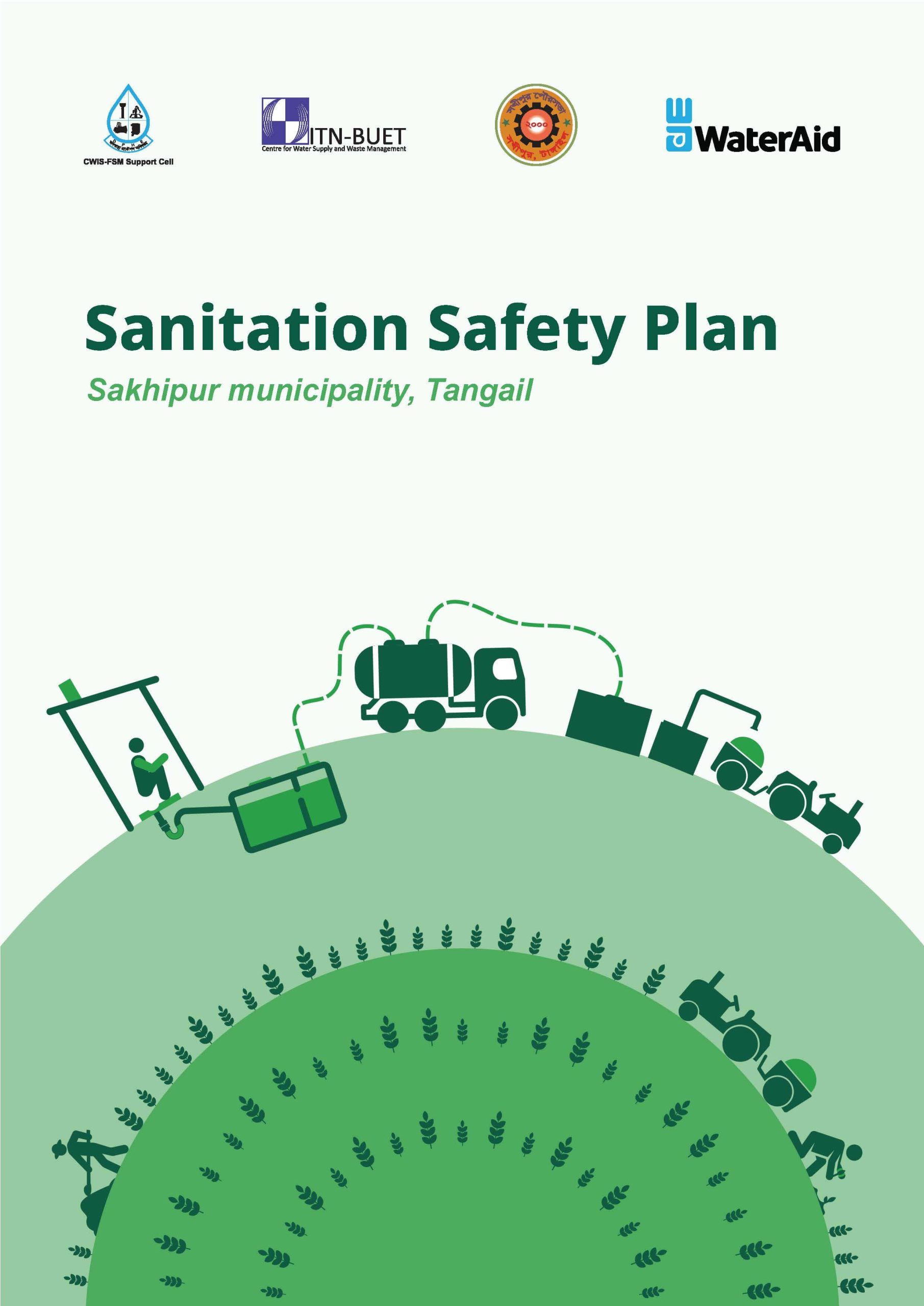Sanitation Safety Plan-Sakhipur Municipality-Tangail
Publisher(s): WaterAid Bangladesh

Category(s): Handbook/Guidebook
Language: English
Publication Year: 2023
Document Type: PDF
ISBN 13: 9789843540409
Sakhipur municipality, under district of Tangail having population of 30,028 in an area of around 13. 77 sq. km is experiencing rapid increase of population, and insufficient sanitation and faecal sludge management (FSM) despite of having a successfully FSM system ensuring sanitation value chain (from containment, collection, transportation, treatment and end use) in place since 2015. WaterAid Bangladesh is providing technical and financial support to Sakhipur municipality to operate FSM system and ensuring safely managed sanitation in the city. A baseline study conducted in 2015 found that 95% of the containment systems in the city are pits, and only 5% are septic tanks. The access to improve sanitation facilities as well as to protect public health at different steps of sanitation value chain, management and investment in improvements on sanitation system in Sakhipur should be made based on adequate understanding of the actual health risks posed by the systems, and how these risks might be controlled. The overall aim is to develop a Sanitation Safety Plan (SSP) for Sakhipur municipality, Tangail, to protect public health through sanitation interventions and guide its investment accordingly.
The specific objectives are to:
-
Systematically analyse the health risks associated in the sanitation value chain in the Sakhipur municipality and propose a comprehensive Sanitation Safety Plan for the city
-
Provide a clear roadmap for monitoring the SSP for ensuring the control measures and verifying the system performance
The scope of the SSP development process is as follows:
-
Define the boundary of SSP (since there is no sewerage system in Sakhipur, only the onsite sanitation system, including FSM will be under the purview of this SSP
-
Set the broad public health objectives of SSP for Sakhipur municipality following the WHO sanitation safety plan (SSP)
-
Develop a complete SSP for Sakhipur municipality to ensure public health safety. This includes conducting hazard analysis and preparing a hazard matrix for the sanitation value chain of Sakhipur municipality
-
Categorise and prioritise risks for different hazards
-
Suggest control measures and improvement plans to mitigate risks
-
Prepare monitoring plan for the control measures and verify the performance
The SSP for Sakhipur municipality has been developed in line with the Sanitation Safety Planning Manual of WHO (WHO, 2015). According to the manual, there are six steps for sanitation safety planning:
-
Preparation for sanitation safety planning
-
Describe the sanitation system
-
Identification of hazardous events, assessment of existing control measure and exposure risks
-
Develop and implement plans
-
Monitor control measures and verify the performances
-
Develop supporting programs along with their review plan.
Developed by
Tanvir Ahmed, PhD Professor, Department of Civil Engineering, BUET; Director, ITN-BUET
Contributors
Md Azizur Rahman Assistant Director (Research), ITN-BUET
Afia Zahin Nita Hossain Research Associate, ITN-BUET
Tahia Afsah Khan Research Associate, ITN-BUET
Mohammad Golam Muktadir Project Director, National Sanitation Project (Phase III); DPHE
Md Tawhidur Rahaman Technical Expert, CWIS-FSM Support Cell of DPHE
Nowrin Mow Graduate Research and Technical Assistant, University of Maryland Eastern Shore
Zarif Iftekhar Rasul Graduate Research Assistant, Colourado State University
Hossain Ishrath Adib Director - Programmes, WaterAid Bangladesh
Partha Hefaz Shaikh Director - Policy and Advocacy, WaterAid Bangladesh
K A Amin Specialist - Urban Sanitation and Utility Services, WaterAid Bangladesh
Imamur Rahman Programme Manager, WaterAid Bangladesh
Shakhawat Hossain Programme Officer - Engineer, WaterAid Bangladesh
Sumon Kumar Saha Programme Officer, WaterAid Bangladesh
Abu Hanif Azad Mayor, Sakhipur Municipality
Councilors and officials Sakhipur Municipality
Focus Area
Sanitation, CWIS
Keywords
Sanitation Safety Plan, Municipality
Country
Bangladesh
Copyright
This is an open access work distributed under the terms of the Creative Commons Attribution License, which permits unrestricted use, distribution, and reproduction in any medium, provided the original work is properly cited.
No comment yet.